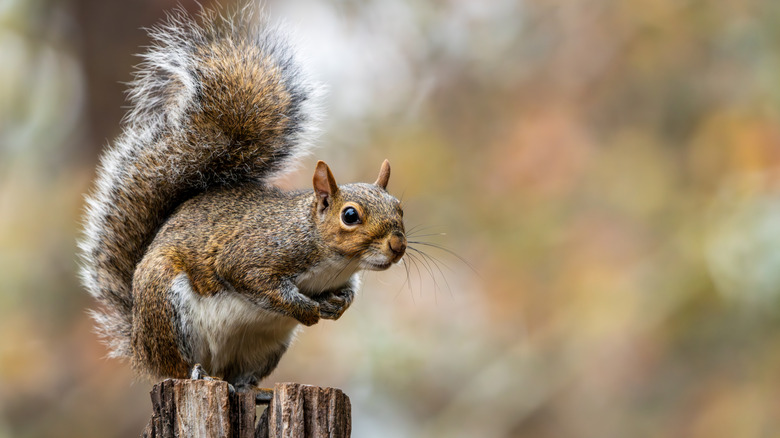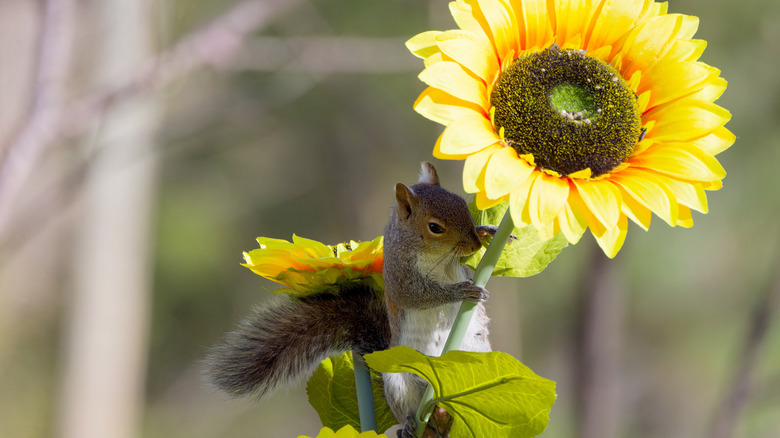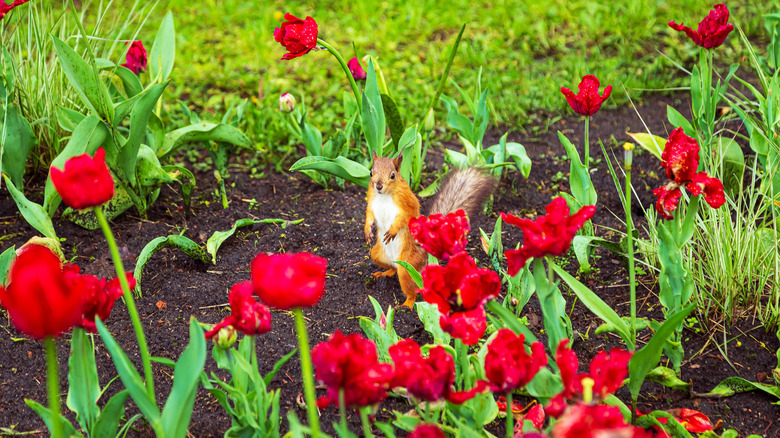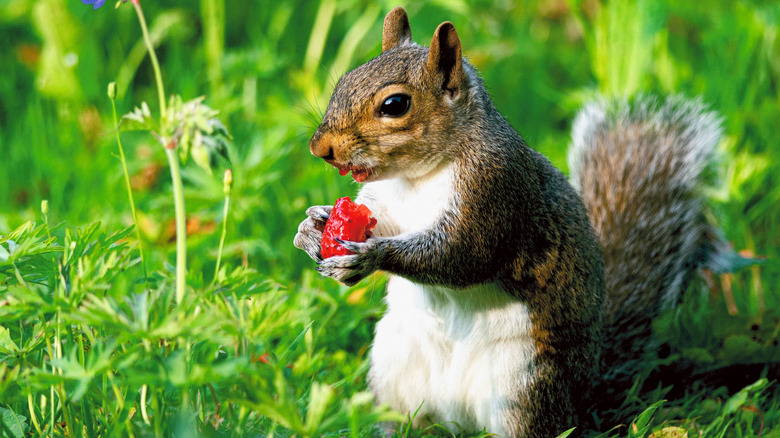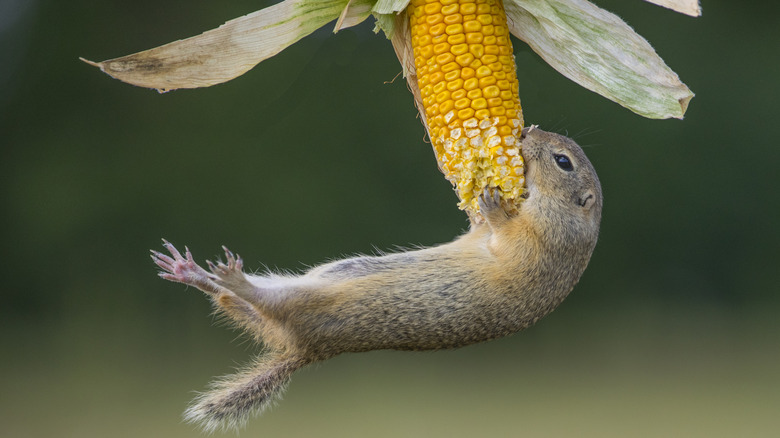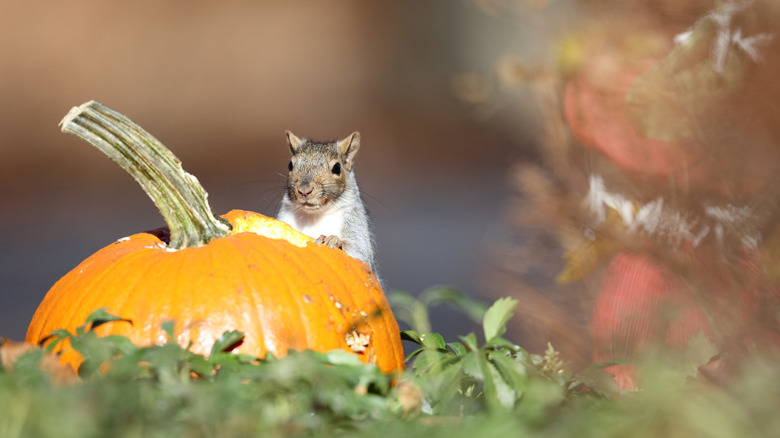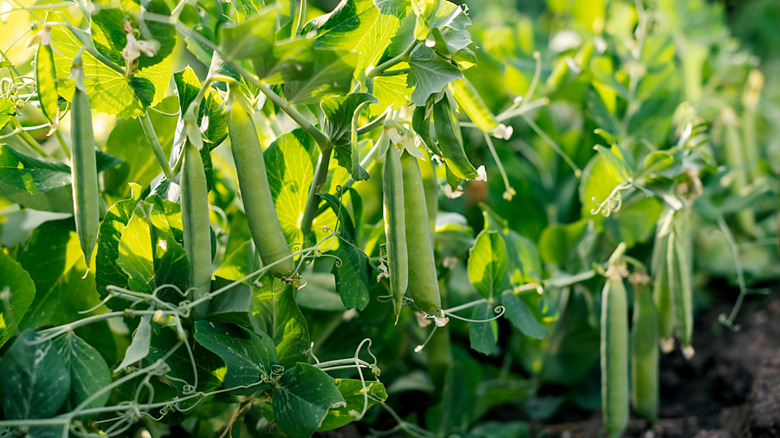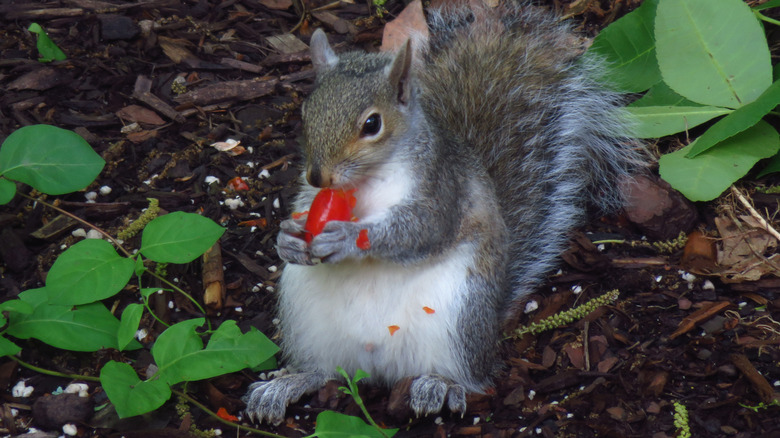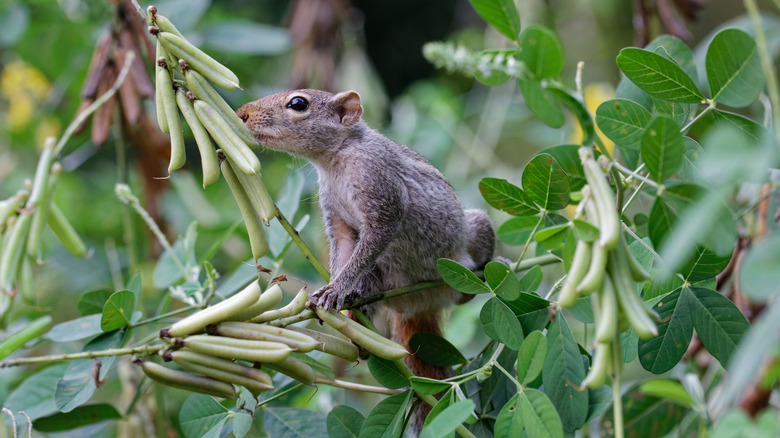8 Plants To Steer Clear Of If You Want To Avoid Attracting Squirrels To Your Garden
Squirrels might look cute scampering around your yard, but they can quickly turn into your garden's worst enemy. These little critters don't just nibble on plants; they actively dig up bulbs and raid vegetable beds. Much like how they remember where they bury nuts, once a squirrel finds a reliable food source, they will keep coming back, often with friends. If you start noticing half-eaten tomatoes, dug up soil, or shredded leaves in the yard, chances are squirrels are to blame. There are plenty of plants you can use to keep squirrels at bay in your garden, but the best method is to simply avoid planting the things that they love the most.
Squirrels are happy to eat whatever they can find, but have particular tastes for plants that produce nuts, seeds, and tender stems. They are also attracted to fruits and vegetables with softer skins, making many common garden plants vulnerable. Even flowers aren't safe from squirrels, and they will quickly try to dig up bulbs for a quick snack or just chew through the stems. What seems small now can quickly destroy an entire crop and even introduce new pests into your garden. While no garden can be completely squirrel proof, knowing which plants to avoid can certainly help reduce their interest.
Sunflowers
Sunflowers (Helianthus annuus) might as well be neon "Eat Here" signs for squirrels. Sunflower seeds are packed with fats and proteins that squirrels crave, especially when they are preparing for winter. They'll dig up freshly planted sunflower seeds before they even have time to sprout and once established, they'll climb up the stalks and feast on the developing seed heads. Even more frustrating is that squirrels will often damage more than what they eat, knocking over mature plants and leaving half-chewed seedheads, which only attract more critters to the scene.
Tulips
Tulips (Tulipa) are another plant that squirrels will enjoy during different growth phases. When bulbs are freshly planted, they'll start digging them up like buried treasure due to their resemblance to nuts and having nutrients that squirrels need. If your plants can make it through that phase unscathed, squirrels will happily target the emerging stems as well, biting them off at ground level just as flower buds begin to form. The use of gravel or sharp mulch on top of the soil can help deter digging, but if a squirrel wants its meal, it'll find a way.
Strawberries
Strawberries (Fragaria ananassa) are like squirrel candy, and their low-growing status makes them easy targets for hungry varmints. The problem isn't just the berries being eaten, it's the wasted ones. Squirrels will typically take a single bite from multiple fruits, ruining an entire crop and leaving rotted fruit around, primed to draw in other pests. The plants themselves will suffer as well as squirrels dig around the soil and disturb the strawberries' shallow root systems. Use netting to protect your berries until it's time to harvest them.
Corn
Corn (Zea mays) presents squirrels with an all-you-can-eat buffet from seedling to harvest. Squirrels will happily dig up freshly sown seeds, and as the plant grows, they'll continue their attack. When ears form, squirrels will easily peel back the husks and devour developing kernels. Even the height doesn't scare them away. Squirrels will balance on stalks or jump from nearby trees to reach their precious meals. To help deter them, try creating a perimeter of plants that squirrels can't stand.
Pumpkins
Squirrels love pumpkins (Cucurbita pepo) and squash at almost every stage of growth. They'll dig up seeds after planting and eventually chew holes right through the developing fruits. Unlike bigger animals that will eat entire sections, squirrels make small holes throughout, which helps introduce rot, ruining the entire fruit. Pumpkin seeds are full of protein, which squirrels love. Even giant pumpkins aren't safe as squirrels will take their time to gnaw right through the thick rinds to get to the good stuff.
Peas
Most peas (Pisum sativum) are the perfect squirrel snack from beginning to end. They'll attack the seeds, the stems, and later climb supports to get at the pods. The damage can quickly go beyond eaten peas as squirrels often pull entire vines down in their pursuit of food. Sugar snap peas are certainly the most vulnerable because of their sweet taste. You can always try growing them in a seed starter and then transplanting them, or use floating row covers until the plants have had time to establish.
Tomatoes
Much like some of the other fruits, squirrels ruin these plants by only taking small bites out of multiple tomatoes (Solanum lycopersicum) instead of eating a single one. The behavior will quickly ruin an entire crop and leave your hard work out in the open to rot. Squirrels are highly attracted to tomatoes once they start to ripen and will sample the fruits as soon as possible. Once they've discovered this smorgasbord, they'll return often to keep their bellies full. Surrounding your plants with hardware cloth is a good way to keep them out, as well as installing motion-activated sprinklers.
Beans
Squirrels love beans (Phaseolus) because they are packed with protein and nutrients that squirrels actively seek out. Like many other plants, squirrels will attack beans throughout the entire growing cycle. From planting, when squirrels dig up and eat bean seeds before they can germinate, to the fully established pods. Pole beans are particularly vulnerable because the way they grow makes it easy for a squirrel to access them from above. Even heavy-bearing plants can be completely stripped in just a few days once squirrels discover them. To help deter them, try surrounding them with marigolds — an easy-to-grow flower that squirrels can't stand.
